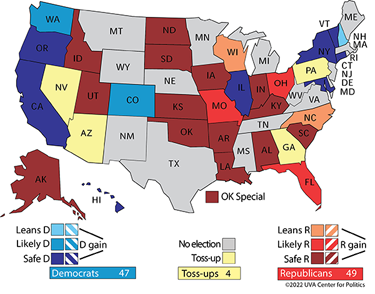Looking at US politics and the crucial 2022 midterm elections from we the north
Jun 14th, 2022 | By Randall White | Category: In BriefNORTH AMERICAN NOTEBOOK. RANDALL WHITE, FERNWOOD PARK, TORONTO, 14 JUNE 2022. Last week I had lunch on the leafy sunshine back patio of a long-established local bar with an old colleague and friend seriously down on the USA.
(And today this is only slightly remarkable in someone born and raised in a neighbouring state of the Union, who has now lived most of his adult life in the northern confederation of 1867.)
In some ways I agree with my friend about the present state of the land of his birth. But I also have personal reasons for wanting to see at least some strategic regions of the USA today with a future for the people who live there. And I have lately been warmed by the advertising slogan, “The Los Angeles Times … The state of what’s next.”
California for example (with a population slightly larger than all of Canada) has its problems. And its government could stand some reform. But who and what else hasn’t and couldn’t and so forth. In this as in other places there are still large parts of America’s too-little-celebrated remarkable diverse geography where civilization prevails. (And, to be broad-minded, I suppose I should say on either of two broad definitions, one of which I certainly do not accept myself.)
US midterm elections : historical background
It is in this spirit in any case that I have recently started thinking more or less seriously about US politics, with special reference to the legendary midterm elections — to be held this coming November 8, 2022 — less than five months away.
(And I note with special reference to some of my fellow counterweights editors that the interested North American audience is also now avidly contemplating the continuing TV presentation from the congressional committee investigating the January 6, 2021 attack on the US Capitol in Washington, DC — with some attackers waving banners that proudly proclaimed “TRUMP”!)
The historical experience since 1862 has been that the president’s party (in 2022 Democrats of course) has lost seats in the House of Representatives in every midterm election except 1902, 1934, 1998, and 2002.
The results in the Senate have been somewhat more favourable to the president’s party. It lost no Senate seats (and often gained) in 1862, 1866, 1882, 1886, 1890, 1898, 1902, 1906, 1914, 1934, 1962, 1970, 1982, 1998, 2002, and 2018. (Though note here as well that US Senators were not popularly elected by US citizens until the Seventeenth Amendment to the Constitution took effect in 1913. Before this “senators were elected by state legislatures.”)
The 2022 midterms : some idiot introductions
To start with on the 2022 midterms the FiveThirtyEight website (“UPDATED JUN. 10, 2022, AT 10:47 AM”) suggests that Republicans are indeed currently ahead of Democrats, in “Do Voters Want Democrats Or Republicans In Congress? … An updating estimate of the generic congressional ballot, based on polls that ask people which party they would support in an election.” But the lead is far from vast (Republicans 45.0%, Democrats 42.6%) — and it was slightly greater a month ago than it is today.
In the real world of course the November 8 midterm elections are considerably more complicated than a simple “generic congressional ballot” might suggest. Taking a leaf from J. Stefan Dupré’s long-ago American Government course at the University of Toronto, I am starting with a potentially helpful “British subject’s idiot introduction.” In this case it is “Everything you want to know about the 2022 US midterm elections … When are they? What are they? Why are they!?” by Emily Tamkin, “senior editor, US” at the venerable UK publication New Statesman.
Ms. Tamkin begins with : “The United States will hold its midterm elections on 8 November 2022. They will shape the second half of Joe Biden’s term as president and, ultimately, the country … Members of the House of Representatives run for re-election every two years, so all 435 House seats are up for election. Thirty-five Senate seats are, too (senators hold their positions for six years). There are also numerous gubernatorial elections and local elections … At the moment, the Democrats control the House: they hold 221 seats to the Republicans’ 208. (Six seats are vacant.) The Senate is equally split, with 50 members from each party. Kamala Harris, the vice-president, has a tiebreaker vote so the Democrats are nominally in control.”
Ms. Tamkin says a number of other interesting things. But for a modern Canadian citizen’s advanced idiot introduction I finally turned to four intriguing items from the CNN website : “There’s a lot at stake with midterms this year. Find out when your state is voting” ; “A roadmap to the 2022 midterm elections” ; “20 state and local elections to watch this year” ; and “The 10 Senate seats most likely to flip in 2022.”
Two tentative conclusions

My first tentative conclusion from my initial quick look at the 2022 US midterm elections — from north of the lakes in the middle of the mid-June 2022 TV presentation from the congressional committee on the January 6, 2021 attack on the US Capitol — has to do with the impact of the at least well-done presentation itself.
FiveThirtyEight presents its generic congressional ballot calculations for the past year. Democrats were actually ahead of Republicans until the middle of this past November. And if there is any serious strategic political point to the January 6 committee TV presentation, it lies in its potential impact on the fortunes of Democrats in what many seem to agree are unusually crucial 2022 midterm elections.
(I agree that something closer to the truth about the depths of what happened on January 6, 2021 is important to get into the official historical record of government documents. And to me it has long been clear that, whatever the exact lawyerly technicalities may be, former President Trump played some serious role in what did happen. But I still can’t quite see how Democracy in America can finally put someone who won 74 million votes in jail, even if his rival won 81 million. As one modestly positive sign on the impact of the January 6 TV so far, on the other hand, I am now finding Scott Jennings’s CNN TV contributions slightly less offensive.)
My second conclusion comes from reviewing the CNN website material noted above in all its vast complexity. This finally brings home the adage that this complexity itself may be the USA today’s most effective shield against any ultimate authoritarian political system. In any case CNN’s list of “20 state and local elections to watch this year” is bound to seem somewhat exotic to Canadians accustomed to the different and duller institutions of “Westminster” or British-style parliamentary democracy.

Different states of the USA do different things to start with (and there are 50 states!). And, eg, what would be cabinet ministers reporting to a premier in a Canadian province can be elected as partisan cabinet ministers in their own right in US states (as opposed to ordinary MLAs, MNAs, or MPPs) — as in elections for Michigan secretary of state, Colorado secretary of state, Kansas attorney general, Iowa attorney general. And then in Democracy in America some states even elect judges — as in Harris County, Texas, county judge ; and North Carolina Supreme Court!
Of course, as fascinating as it may be, none of this directly affects what may or may not happen to Democrats in the federal House of Representatives and Senate this coming November 8. Like many others in many parts of the world (and especially just next door in We the North), I remain concerned. And my concern is not diminished by the just-received latest Gallup report on the issue : “Usual Midterm Indicators Very Unfavorable for Democrats”!! (I am personally praying 2022 finally proves a very unusual year, in this as other ways.)






